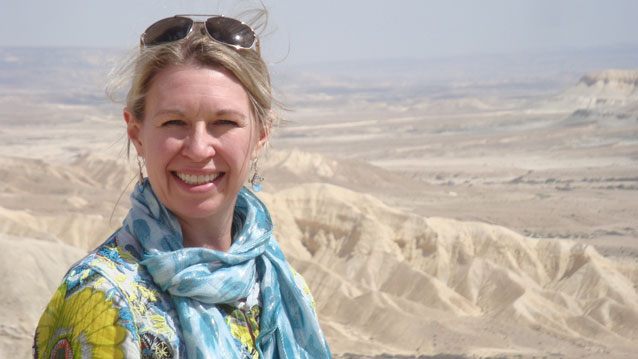EVANSTON, Ill. --- If there’s a coup d’état brewing overseas or a tenuous ceasefire begins to break down, chances are Julie Anne Friend knows about it even before the story hits the news.
Friend, director of global safety and security for Northwestern University, was honored in November by the U.S. Department of State for her national leadership in addressing security and safety issues in the world of academia.
Friend is on call 24/7 as a first responder for international emergencies involving Northwestern students, faculty or staff. She needs to stay one step ahead of dangerous situations around the world to keep Northwestern travelers out of harm’s way.
At the same time, she has been doing a stellar job in raising security issues in academia nationally, according to the honor from the Overseas Security Advisory Council (OSAC), a division of diplomatic security in the U.S. Department of State.
Friend received the Technical Advisor Achievement Award “for raising awareness of the health, safety and security concerns of academia and for better connecting the academic world with a broad network of diplomatic security officials around the globe.”
“Our communities and workplaces are increasingly diverse, and employees of all ranks travel overseas now more than ever,” said Friend, touting study abroad as a vital component to a college education for many. “A student’s ability to put themselves in the shoes of someone who is struggling to learn a second language or whose religious or political beliefs differ from their own promotes both economic efficiency and community harmony.”
Friend is as grateful for OSAC’s efforts as OSAC is for hers.
“The benefit of having a relationship with OSAC is that you have access to regional security analysts who can answer specific questions about a location or activity,” Friend said. “As far as study abroad goes, we are always looking at developing countries where crime and safety are concerns, and any country where there is regular civil unrest or a weak government is always on my radar.”
Her efforts help not only Northwestern students but also international travelers from universities and colleges all over the U.S.
“(Friend’s) experience addressing security and safety issues in the world of academia has been extremely beneficial to the council,” said Sandra Cowie, the chair of the Outreach and Engagement Committee.
OSAC was created in 1985 to promote the safety and security of U.S. businesses abroad by providing the private sector with information and intelligence formally privy to only government officials.
Over the years, its mission grew to encompass nongovernmental organizations, faith-based organizations and finally academia, all of which support people working and learning in foreign countries.
A security trailblazer, Friend was among the first representatives of academia to take up a meaningful role at OSAC. She was appointed as a technical advisor to OSAC in 2008 when working at the Office of Study Abroad at Michigan State University.
“Under Secretary of State Condoleezza Rice, an academic herself, OSAC moved to bring academia into the fold,” Friend said. “She asked OSAC’s leadership, ‘Why are we not engaging with colleges and universities?’ So, that’s what it did.”
As part of a normal rotation of appointments, Northwestern was invited in 2014 by U.S. Secretary of State John Kerry to serve on the council. Friend now represents the University on the council, rather than serving as a technical advisor.
Throughout her career, Friend has provided emergency response leadership to students and faculty on a number of the medical and security crises that have dominated world news. They include the 2005 London transit bombings, the 2008 Georgian-Russia conflict, the 2010 Haitian earthquake, the 2011 Egyptian revolt, the 2011 Japanese earthquake/tsunami/nuclear reactor malfunction, the 2012 seven-day Gaza-Israel conflict, the 2013 H7N9 outbreak in China, the 2013 anti-government demonstrations in Turkey, the 2013 military coup in Egypt, the 2013 typhoon over the Philippines, the 2014 Israel-Palestine conflict and the 2014 outbreak of Ebola hemorrhagic fever in West Africa.


